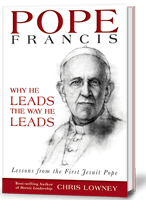 In the new book, Pope Francis: Why He Leads the Way He Leads, author Chris Lowney delves into what made Pope Francis who he is today and the impact of his Jesuit formation. Enjoy this excerpt.The pope has already been articulating a vision that challenges his Church to reimagine itself in the twenty-first century:
In the new book, Pope Francis: Why He Leads the Way He Leads, author Chris Lowney delves into what made Pope Francis who he is today and the impact of his Jesuit formation. Enjoy this excerpt.The pope has already been articulating a vision that challenges his Church to reimagine itself in the twenty-first century:
- He challenged “lukewarm Christians” and “couch potato” Christians to engage much more energetically in spreading the Church’s message, not to “take refuge . . . in a cozy life,” but to get beyond our “comfort zones” and live with greater “apostolic fervor.”
- He challenged his Church to be more forthrightly “poor, and for the poor.”
- He warned Vatican diplomats-in-training that “careerism is leprosy.”
- He challenged a global culture in which “money . . . for the mighty of this earth, is more important than people.”
- He challenged his own fellow bishops to be “Men who love . . . poverty, simplicity and austerity of life.”
He asked Brazilian bishops bluntly, “Are we still a Church capable of warming hearts?” . . .[H]e is fundamentally challenging our lifestyles and priorities, yet we are not dismissing him as a curmudgeonly old scold. Rather, we seem to appreciate that a plain speaker is telling us uncomfortable truths that we’ve long needed to hear.
But Pope Francis has done more than challenge his own Church; he is challenging our wider culture’s whole approach to leadership by embodying a refreshing, deeply countercultural vision of how leaders live and what they value. He seems deeply self-aware and authentic, for example, while so many prominent public figures nowadays seem superficial and fake, constantly trying to spin us. The pope seems driven by a passion to serve, not by a craving for status, money, or power. Our culture is becoming increasingly self-absorbed and fascinated with superficial pursuits; he is striving to focus us beyond ourselves, on the struggles of our neediest brothers and sisters around the world. As I watched him, I started to wonder whether this unlikely choice for pope, even while igniting change in his Church, could be an equally unlikely catalyst for a long-overdue global conversation about leadership.
Perhaps he can inspire us to take on what might be called the new leader’s habits. Cardinal Bergoglio literally donned a new habit, of papal white. And to lead well in this new century, the rest of us need new habits too, not literally, but figuratively—new ways of preparing ourselves to exercise leadership in our work and family lives. His call to lead his Church might invite profound reflection on the leadership call (yes, leadership is a call) that comes to each of us (yes, each of us), whether we live that call as chief executives, parents, or, who knows, as someday a pope.
And thus, this book about Pope Francis and how his Jesuit background has informed his leadership values and principles. It’s not a biography. Plenty of those have already been written; yet, oddly, they have largely glossed over the Jesuit spirituality that prepared him to lead and still drives his thinking. Don’t take my word for its critical importance; take his: “I feel like I’m still a Jesuit in terms of my spirituality, what I have in my heart. . . . Also, I think like a Jesuit.” Clearly, we can only understand this pope by first understanding what the following chapters explore: what it means to “think like a Jesuit.”
But, in another respect, this book is as much about the rest of us as it is about the global leader of the Catholic Church. Pope Francis is our case study, a prism, the catalyst for us to ponder why we are so disappointed with the leadership status quo, to imagine an approach to leadership that would better inspire us, and to articulate the commitments we can make to become better leaders in our own lives.
Learn more about the book here.

Je suis interessée par les écrits du Pape François que j’apprecie beaucoup et pour qui je prie chaque jour.
I have learned so much about Ignatian spirituality from this blog – now the world has an opportunity to learn about it through Pope Francis. This will be for the benefit of all.